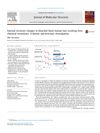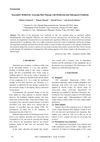 4 citations,
November 2023 in “Frontiers in immunology”
4 citations,
November 2023 in “Frontiers in immunology” New treatments targeting T-cell pathways are needed for better alopecia areata management.
 4 citations,
October 2022 in “Evidence-based complementary and alternative medicine”
4 citations,
October 2022 in “Evidence-based complementary and alternative medicine” Ficus carica extract improved fertility in rats and may help with certain health conditions.
 4 citations,
January 2021 in “Skin appendage disorders”
4 citations,
January 2021 in “Skin appendage disorders” Hair straightening can damage hair and pose health risks, including exposure to carcinogens and hair loss.
 4 citations,
December 2020 in “Mammalian genome”
4 citations,
December 2020 in “Mammalian genome” Harlequin mutant mice have hair loss due to low AIF protein levels and retroviral element activity.
 4 citations,
January 2020 in “Cells”
4 citations,
January 2020 in “Cells” The research found that the gene activity in mouse skin stem cells changes significantly as they age.
 4 citations,
July 2019 in “Children (Basel)”
4 citations,
July 2019 in “Children (Basel)” The review concludes that more research is needed to better improve the health outcomes for people with Polycystic Ovarian Syndrome.
 4 citations,
June 2019 in “International Journal of Dermatology and Venereology”
4 citations,
June 2019 in “International Journal of Dermatology and Venereology” Some skin diseases may indicate a higher risk of metabolic syndrome and related health issues.
 4 citations,
April 2019 in “Cosmetics”
4 citations,
April 2019 in “Cosmetics” Hair stiffness is higher when it has more para-like cortical cells.
 4 citations,
December 2018 in “Macedonian Journal of Chemistry and Chemical Engineering”
4 citations,
December 2018 in “Macedonian Journal of Chemistry and Chemical Engineering” A new method accurately measures amino acids in treated hair, showing bleaching reduces amino acids while protein treatments increase them.
 4 citations,
January 2018 in “Elsevier eBooks”
4 citations,
January 2018 in “Elsevier eBooks” Hormones are crucial for regulating body functions and imbalances can lead to health issues.
 4 citations,
January 2018 in “Cancer treatment and research”
4 citations,
January 2018 in “Cancer treatment and research” The document concludes that systemic therapy is becoming more important in treating head and neck cancer, with new treatments showing promise.
 4 citations,
November 2017 in “Scientific Reports”
4 citations,
November 2017 in “Scientific Reports” The research provides a gene-based framework for hair biology, highlighting the Hippo pathway's importance and suggesting links between hair disorders, cancer pathways, and the immune system.
 4 citations,
August 2017 in “International journal of molecular sciences”
4 citations,
August 2017 in “International journal of molecular sciences” The conclusion is that Pigmented Epithelioid Melanocytoma can start from hair follicle stem cells or from a mole on the skin.
 4 citations,
November 2015 in “Journal of Investigative Dermatology”
4 citations,
November 2015 in “Journal of Investigative Dermatology” Testosterone may worsen hair loss by affecting hair growth signals, while different prostaglandins can either hinder or promote hair growth.
 4 citations,
January 2015 in “Sen'i Gakkaishi”
4 citations,
January 2015 in “Sen'i Gakkaishi” Hair and wool strength is affected by the number and type of bonds in their protein structures, with hair having more protein aggregates than wool.
 4 citations,
November 2014
4 citations,
November 2014 The skin protects the body, regulates temperature, senses touch, and makes vitamin D.
 4 citations,
August 2014 in “Journal of molecular structure”
4 citations,
August 2014 in “Journal of molecular structure” Chemical treatments on bleached black hair change its internal structure by breaking and reforming bonds, and treatments with hydrolyzed eggwhite protein help repair it.
 4 citations,
December 2013 in “Acupuncture and related therapies”
4 citations,
December 2013 in “Acupuncture and related therapies” N-acetyl-cysteine shows promise in treating various diseases and may improve skin and hair conditions, but more research is needed on dosages and long-term effects.
 4 citations,
January 2012 in “Chemical Immunology”
4 citations,
January 2012 in “Chemical Immunology” Some drugs, especially biologics, can cause skin reactions that look like other skin diseases, and stopping the drug usually helps clear up these reactions.
 4 citations,
January 2008 in “Food Science and Technology Research”
4 citations,
January 2008 in “Food Science and Technology Research” Mature leaves of 'Saijo' persimmon have the most vitamin C and both mature leaves and new shoots are rich in polyphenols.
 4 citations,
October 2007 in “Dermatologic Clinics”
4 citations,
October 2007 in “Dermatologic Clinics” Glucocorticoids and sex hormones affect skin health, with potential for targeted treatments to minimize side effects and treat skin conditions.
 4 citations,
January 2007 in “Sen'i Gakkaishi”
4 citations,
January 2007 in “Sen'i Gakkaishi” Permed hair degrades faster and shows more damage after protease treatment compared to untreated hair.
 4 citations,
June 2002 in “Clinical and experimental dermatology”
4 citations,
June 2002 in “Clinical and experimental dermatology” Effective treatment for hidradenitis suppurativa varies, with antibiotics commonly used and surgery as an option, but no single method is universally successful.
 3 citations,
January 2024 in “Signal transduction and targeted therapy”
3 citations,
January 2024 in “Signal transduction and targeted therapy” Lymphatic vessels are essential for health and can be targeted to treat various diseases.
 3 citations,
November 2023 in “Frontiers in cell and developmental biology”
3 citations,
November 2023 in “Frontiers in cell and developmental biology” Melanocytes are important for skin and hair color and protect the skin from UV damage.
 3 citations,
June 2023 in “Frontiers in medicine”
3 citations,
June 2023 in “Frontiers in medicine” Oxidative stress may contribute to hair loss in alopecia areata and antioxidants could potentially help as a treatment.
 3 citations,
May 2023 in “Clinical drug investigation”
3 citations,
May 2023 in “Clinical drug investigation” JAK inhibitors for alopecia areata are linked to minor side effects like headache and acne, but not to an increased risk of serious adverse events.
 3 citations,
January 2023 in “PloS one”
3 citations,
January 2023 in “PloS one” Implanting hair-follicle stem cells in mice brains helped repair brain bleeding and reduced brain inflammation.
 3 citations,
December 2022 in “bioRxiv (Cold Spring Harbor Laboratory)”
3 citations,
December 2022 in “bioRxiv (Cold Spring Harbor Laboratory)” The research reveals how early embryonic mouse skin develops from simple to complex structures, identifying various cell types and their roles in this process.
 3 citations,
October 2022 in “Han'gug dongmul jawon gwahag hoeji/Han-guk dongmul jawon gwahak hoeji/Journal of animal science and technology”
3 citations,
October 2022 in “Han'gug dongmul jawon gwahag hoeji/Han-guk dongmul jawon gwahak hoeji/Journal of animal science and technology” Adding L-glutamine to the diet of Hanwoo steers may boost their immune system and help them cope with heat.






























